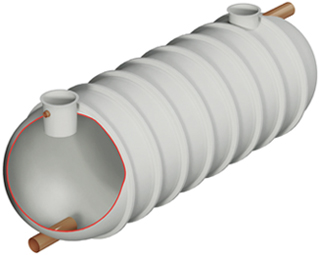Particularly cold weather can be bad news for homeowners with a septic tank system. Icy temperatures can result in various components of a septic system running the risk of freezing up in the harsh conditions. Clearly, this will create problems for your home’s wastewater treatment capabilities and should be avoided at all costs. Let’s take a look at how you should best deal with the cold and your septic system over the frosty winter months.
Freezing problems
If temperatures drop sufficiently low, it is possible for parts of your septic system to freeze. So long as your system has been installed correctly and is fully functioning, this should be a very rare occurrence. However, if conditions permit, icy temperatures can pervade underground and cause the wastewater within the system to freeze, blocking pipes and preventing proper functioning.
It is possible for many different areas of your system to freeze, including:
- The pipes between the house and the septic tank
- The septic tank
- The pipes between the septic tank and drainfield
- The drainfield
How to prevent freezing
You may not be able to control the weather, but their are several preventative measures you can take to reduce the likelihood of a frozen septic system.
Layer up – Having protective layers over where your septic tank and pipework lie can provide valuable protection against the seeping cold. Ensure you plant grass across the area that houses your septic system and, when the cold weather hits, pile on a thick layer – preferably around a foot deep – of mulch, hay, leaves, or other such material.
Frequent usage – By using your system regularly, particularly if you’re flushing through warm water, you can discourage freezing. Flowing water is a lot less likely to freeze than sitting water in a seldom used system.
Fix leaks – A fully working system will be more efficient and won’t be susceptible to slow, ever-present water which can easily freeze.
Stop traffic – Keep vehicular and foot traffic off your drainfield. Not only will this protect your drainfield from damage, but traffic can have the unwanted side effect of compacting the ground and driving cold deeper towards your septic system.
Insulate – Make sure your system has sufficient insulation installed. This includes pipe insulation, foam panels and a thick enough covering of soil.
What to do if your septic system freezes
If your septic system does freeze, you should contact a professional. They will be able to locate the frozen section, safely thaw out any blockages, give useful advice, and offer an effective solution to any issues which become evident during the inspection.
Wildon UK are drainage and wastewater treatment experts who are on hand to offer a wide variety of services and professional advice to customers in Stoke-on-Trent and further afield across the UK. With many years of experience and a team of highly trained, skilled engineers, we are able to provide high quality installations, maintenance and repair work for a extensive range of wastewater systems. Get in touch with our team today with any enquiries.
Go back to








